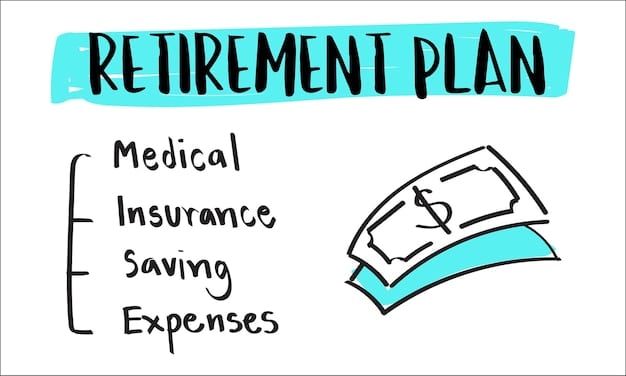Navigating Healthcare Costs in Retirement: A 2025 Financial Guide

Navigating healthcare costs in retirement requires careful financial planning, especially as we approach 2025; understanding Medicare, supplemental insurance options, long-term care considerations, and strategies for managing these expenses is crucial for a secure retirement.
Planning for retirement involves many considerations, and a significant one is healthcare. Navigating healthcare costs in retirement: A financial planning guide for 2025 can help you understand the landscape and prepare effectively, ensuring your financial security and peace of mind.
Understanding the Landscape of Retirement Healthcare Costs
Retirement often brings increased healthcare needs, which translates to higher expenses. Understanding the various components of these costs is the first step in effective financial planning. Let’s delve into understanding what these costs are.
Medicare Basics
Medicare is a federal health insurance program for people aged 65 and older, as well as certain younger people with disabilities or chronic conditions. It’s crucial to understand its different parts and what they cover.
- Part A covers hospital stays, skilled nursing facility care, hospice, and some home health care.
- Part B covers doctor visits, outpatient care, preventive services, and some medical equipment.
- Part C, also known as Medicare Advantage, allows you to receive your Medicare benefits through a private insurance company.
- Part D covers prescription drugs.

Understanding these parts can help you better estimate your potential out-of-pocket expenses and make informed decisions about your coverage.
Estimating Your Healthcare Expenses
Estimating your healthcare expenses in retirement is essential for creating a realistic financial plan. Here’s how to approach this task. Projecting future costs requires considering a variety of factors. These factors can greatly influence the accuracy of your financial planning.
Factors to Consider When Estimating
Several factors can affect your individual healthcare costs in retirement. Taking these into account will help you estimate more accurately.
- Age and Health: Older individuals and those with chronic conditions typically have higher healthcare expenses.
- Lifestyle Choices: Habits like smoking, diet, and exercise can impact your health and, consequently, your healthcare costs.
- Geographic Location: Healthcare costs vary significantly depending on where you live.
Additionally, inflation and changes in healthcare policies can also influence future costs. Planning for these variables is critical.
Budgeting Strategies for Healthcare in Retirement
Effective budgeting is crucial for managing healthcare costs in retirement. Implementing proactive strategies can make a significant difference. Setting aside specific funds will help ensure you’re prepared for unexpected medical bills.
Creating a Healthcare-Specific Budget
Designate a portion of your retirement income specifically for healthcare expenses. This budget should cover premiums, deductibles, copays, and other out-of-pocket costs.

Regularly review and adjust this budget to account for changes in your health, insurance coverage, and healthcare costs. Tracking your spending can help identify areas where you can reduce costs.
Exploring Supplemental Insurance Options
Medicare doesn’t cover all healthcare expenses, making supplemental insurance an important consideration. Understanding your options can help you choose the best coverage for your needs. Supplement options can provide additional financial security and peace of mind.
Medigap Policies
Medigap policies, also known as Medicare Supplement Insurance, are private insurance plans that help cover some of the gaps in Medicare coverage, such as deductibles, copays, and coinsurance.
- They are standardized, meaning the benefits are the same regardless of the insurance company.
- Different Medigap plans offer varying levels of coverage.
- You must have Medicare Part A and Part B to enroll in a Medigap policy.
When considering Medigap, it’s crucial to compare different plans and choose one that aligns with your healthcare needs and budget.
Planning for Long-Term Care
Long-term care is a significant healthcare expense that many retirees face. Planning for this potential need is crucial. Assessing your risk and understanding your options are essential steps.
Understanding Long-Term Care Needs
Long-term care includes services and support for individuals who need assistance with daily living activities, such as bathing, dressing, and eating. This care can be provided in various settings, including:
- Nursing homes
- Assisted living facilities
- Home health care
The cost of long-term care can be substantial, and Medicare typically only covers a limited amount of skilled nursing facility care following a hospital stay.
Strategies for Managing Healthcare Costs
Managing healthcare costs in retirement involves proactive strategies to minimize expenses and maximize the value of your healthcare dollars. Taking control of your health and finances can lead to significant savings.
Preventive Care and Wellness Programs
Taking advantage of preventive care services and wellness programs can help you stay healthy and avoid costly medical treatments. Regular check-ups, screenings, and vaccinations can detect potential health issues early.
Many Medicare plans and private insurance companies offer wellness programs that promote healthy lifestyle choices, such as exercise, nutrition, and stress management. Participating in these programs can improve your overall health and reduce your risk of chronic diseases.
| Key Point | Brief Description |
|---|---|
| 💰 Understand Medicare | Familiarize yourself with the different parts of Medicare and what they cover. |
| 🏥 Plan for Long-Term Care | Assess your needs and explore insurance options to cover potential long-term care costs. |
| 💊 Review Medications | Regularly review your medications to identify potential cost-saving alternatives. |
| ✅ Budget Wisely | Create a healthcare-specific budget and track your spending to stay on top of costs. |
Frequently Asked Questions
▼
The crucial first step is understanding the different parts of Medicare and what they cover, as this will form the foundation of your healthcare coverage.
▼
Supplemental insurance helps cover the gaps in Medicare, such as deductibles and copays, providing more comprehensive coverage and reducing out-of-pocket expenses.
▼
Strategies include comparing prices at different pharmacies, using generic medications, and reviewing your drug list with your doctor to identify potential cost-saving alternatives.
▼
Consider factors like your age, health status, lifestyle choices, and geographic location. Use online tools and consult with a financial advisor to get a more accurate estimate.
▼
Long-term care can be very expensive, and Medicare offers limited coverage. Planning helps protect your assets and ensures you receive the care you need without depleting your savings.
Conclusion
Navigating healthcare costs in retirement requires diligent planning and informed decision-making. By understanding Medicare, exploring supplemental insurance options, budgeting effectively, and considering long-term care needs, you can create a financial plan that ensures your healthcare needs are met throughout your retirement years.





